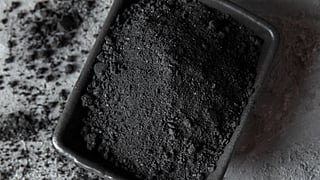Although charcoal toothpaste is marketed as a whitening agent that aids in tooth stain removal, this isn't entirely accurate. In most cases, teeth discoloration results from intrinsic stains that cannot be eliminated by charcoal extraction.
Deeper, intrinsic stains are dark hues that originate inside the tooth and can sometimes be caused by fluoride usage, trauma, poor enamel, or certain medications. Only whitening procedures that reach beneath the teeth's outer layer can lighten these types of stains.
A 2021 study published in Clinical Oral Investigations found no difference in the whitening results of charcoal toothpaste and conventional fluoride toothpaste. According to the study's findings, using charcoal toothpaste may temporarily give the impression of whiter teeth by removing plaque and stains. However, over time, charcoal toothpaste merely erodes tooth enamel, which is irreversibly damaged. [2]
An unscientific study released by the University of Malaya in Malaysia reported that teeth were actually becoming yellower rather than whiter. This is likely because the charcoal was so abrasive that it stripped the enamel—the outermost protective layer of the tooth—exposing the dentin beneath, which has a yellowish tint. [3]
"This is another reason to be very cautious about using such products."
It’s important to note that the whitening effect of activated charcoal toothpaste comes from the removal of extrinsic stains, not from altering the intrinsic color of the enamel. Therefore, the whitening effect attributed to activated charcoal toothpaste is essentially due to its abrasive nature.
References:
1. Charcoal and charcoal-based dentifrices. Brooks, John K. et al. The Journal of the American Dental Association, 2017, Volume 148, Issue 9, 661 - 670
2. Koc Vural, U., Bagdatli, Z., Yilmaz, A.E. et al. Effects of charcoal-based whitening toothpastes on human enamel in terms of color, surface roughness, and microhardness: an in vitro study. Clin Oral Invest 25, 5977–5985 (2021).
3. Yaacob HB, Park AW. Dental abrasion pattern in a selected group of Malaysians. J Nihon Univ Sch Dent. 1990 Sep;32(3):175-80. doi: 10.2334/josnusd1959.32.175. PMID: 2230960.
By Dr. Richa Gupta
MSM


